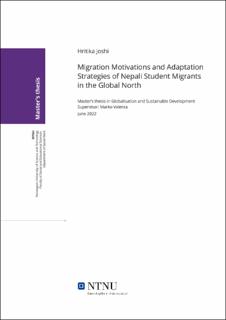| dc.description.abstract | Nepali students today are spread worldwide due to globalization and an increasing migration trend in Nepal. They are always on the lookout for better opportunities, and the countries in Global North are their preferred destinations. This decision to migrate has various motivations and comes with certain costs. Students go through multiple experiences, pleasant and harsh while navigating a completely new life in a foreign land. This study is an exploratory study of the key motivations behind student migration in Nepal, the various experiences they have as migrants, and their integration into the new society.
I employed a qualitative methodology to conduct this study whereby I conducted semi-structured interviews with fourteen Nepali student migrants (and aspiring migrants) to gather information. Three were aspiring migrants, four were recent migrants, and seven were long-term migrants. Similarly, I reviewed secondary data through articles, journals, and research papers to get a deeper insight into the topic and to be able to interpret my primary data coherently.
With push-pull factors of migration, migrant networks, adaptation experiences, and social integration as some of my key themes, I interpreted and analyzed the motivations and experiences of the fourteen migrants as part of my empirical findings. The major push factors identified in this study were Nepal's lack of employment opportunities, lower wages, dissatisfaction with the political situation, and the willingness to follow the ‘trend’ of migration. Similarly, the primary pull factors were better earning opportunities and higher wages, possibilities of staying longer in the destination country, and scholarships and financial aid provided in the destination country. Options of settling abroad permanently were more significant motivators than the quality of education for migrant students.
However, their actual experiences were different and diverse. Most of them struggled to adapt to the new environment. Their experiences grew better as they integrated into contemporary society and adjusted to their new lives. For adaptation, they employed various strategies and built social networks to deal with the culture shock. They were able to adapt to their new lives by spending time in the new environment and with the help of fellow Nepali communities.
Furthermore, I explored the patterns of social integration followed by Nepali migrants. Most respondents depended on the Nepali community as their critical social network, whereas some were equally comfortable with the locals of the destination country too. I also attempted to understand the plans of Nepali migrant students and found that all of them were happy in their current destinations and were willing to stay longer. Hence, Nepali student migrants employed different strategies to navigate the migration policies of the host countries and extend their stay. They chose destinations with easier visa processing, took additional courses to keep their student visas valid even after graduating, and were keen on finding permanent jobs. | |
